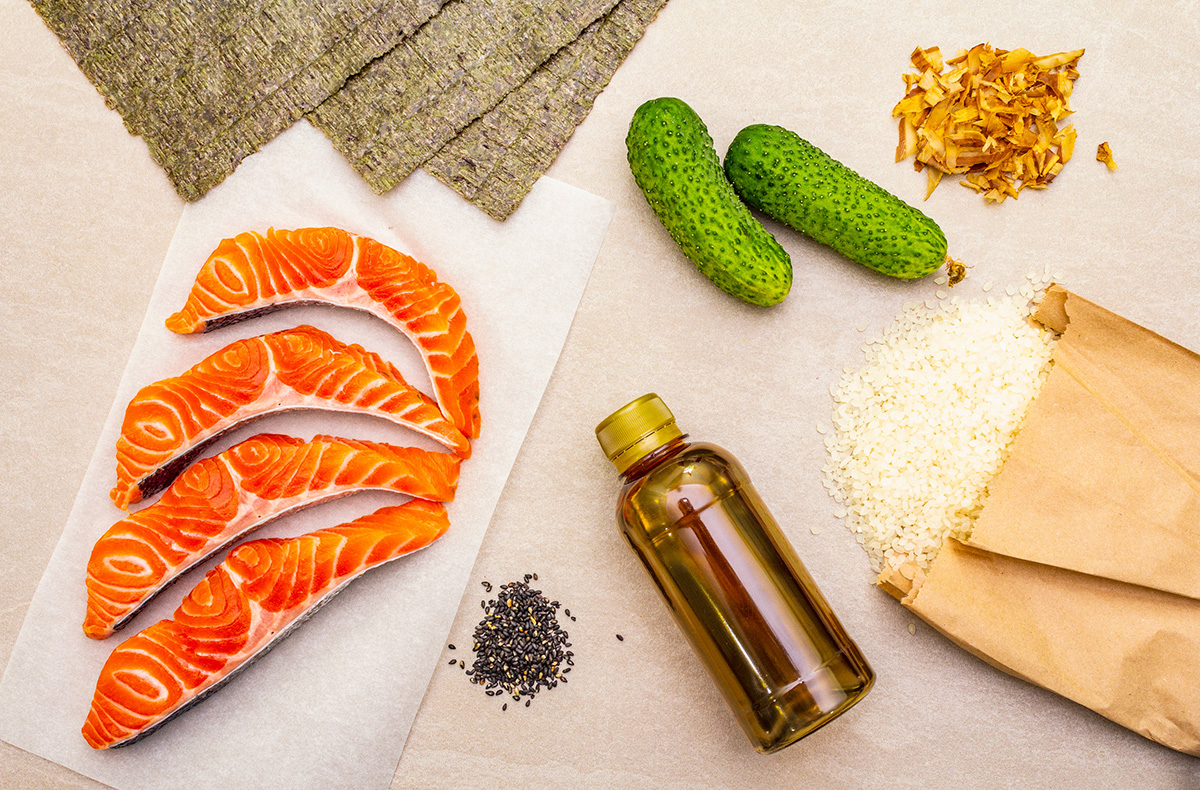The current over-consumption of cereals and seeds in general in our diet leads to a problem: the presence in these foods of abundant omega-6 fatty acids. Omega-6s are a type of polyunsaturated fat which, although important in small amounts for our bodies, are pro-inflammatory if consumed in large quantities. Omega-3 fatty acids, which you have probably already heard of, and which are mainly found in fish (especially oily fish) and other marine animals, in some algae, as well as in certain seeds such as flax, chia or walnuts, are another type of polyunsaturated fat that is essential for our bodies, as we are not able to manufacture them. These fatty acids, among many other functions, such as improving our cognitive capacity by acting positively on our central nervous system, have great anti-inflammatory power and counteract the effect of omega-6 fats.
There is the so-called "omega-3 to omega-6 ratio", which is the ratio between the omega-3 and omega-6 fatty acids we ingest, and which determines whether or not inflammation occurs. Normally, the ratio should be 1:1 or slightly more, with a tolerable ratio of up to 1:5 or so (taking in five times as much omega-6 as omega-3). This is the ratio our ancestors used to have. Today, however, due to our modern diet, this ratio is usually 1:15 or even 1:20 (ingesting up to 20 times more omega-6 than omega-3). In this way, omega-3s do not have sufficient capacity to counteract the effect of omega-6s, and the "balance" of inflammation is tipped towards a pro-inflammatory state in our body.
In addition, there is the aggravating factor of the industrialisation of modern food. We eat more and more processed food, which is very rich in omega-6. In particular, the oils used to cook all these processed foods, which are usually seed oils, such as sunflower oil, for example, whose omega-6 content is very high compared to much healthier oils such as olive oil, avocado oil or coconut oil, which contain very little. The problem is difficult to solve, as it lies at several levels. On the one hand, there is the question of price, usually related to the type of pressing used to extract the oil. Seed oils tend to be cheaper, especially if they are obtained by heat extraction methods. Hot pressing yields much more oil than cold pressing, whereas virgin olive oil is usually extracted by cold pressing methods, which makes the product much more expensive. This means that the food industry does not even consider using better quality oils in their products, as it would make them much more expensive and much less competitive. The same is true in our homes, as many people use this type of oil because it is cheaper, despite the fact that sunflower oil has recently become much more expensive. On the other hand, in addition to the high content of omega-6 that these oils have in themselves, with great pro-inflammatory power, we must add the even more harmful effect on our health that the process of extraction by heat and the use of these oils at high temperatures (pastries for example) has on our health, as the polyunsaturated fatty acids (omega-3 and omega-6) are very sensitive to heat. When heated, these fats change their chemical configuration from "cis" fats to "trans" fats, as if the molecule were twisted. In this way, trans fats are much more pro-inflammatory and pro-oxidant than cis fats, and promote an increase in LDL and VLDL ("bad" cholesterol). Thus, even if it is a seed with a high omega-3 content, such as flax, for example, the extraction method alters these fatty acids and makes them much less healthy if they are extracted using heat. Therefore, from a health point of view, taking ground flaxseed is not the same as taking flaxseed directly or cooking with flaxseed oil, for example. As I have already mentioned, the exposure to heat during oil extraction is often compounded by further exposure to high temperatures during cooking. If we add to this poor storage (as these oils should be protected from light and preferably kept in a refrigerator, which is rarely done), the polyunsaturated fats they contain are guaranteed to be altered, and thus inflammation.
Finally, I would like to clarify the difference between omega-3 fatty acids of plant origin (ALA) and those of animal origin (EPA and DHA). The latter are the ones that are really useful for our bodies, as they are the ones that really have an immunoregulatory, mainly anti-inflammatory, effect. Once ingested, ALA must be converted in the body into EPA and then into DHA. The conversion rate varies from person to person, but generally does not exceed 10%. As a result, a large proportion of the plant-based omega-3s we ingest are never converted into active molecules in our bodies. Thus, a person who only consumes products of plant origin, even if they have a high intake of foods rich in omega-3 ALA, will probably not reach the minimum amounts of DHA and EPA that our body requires. It is for this reason that EPA and DHA supplementation is highly recommended for people following this type of diet.
Bibliography:
Lee B, Moon KM, Kim CY. Tight Junction in the Intestinal Epithelium: Its Association with Diseases and Regulation by Phytochemicals. J Immunol Res. 2018 Dec 16;2018:2645465.
Reyes-Pavón D, Jiménez M, Salinas E. Fisiopatología de la alergia alimentaria. Rev. alerg. Méx. [revista en la Internet]. 2020 Mar. 67(1): 34-53.
Myers A (2016). The thyroid connexion. Littlebrown.
Cholewski M, Tomczykowa M, Tomczyk M. A Comprehensive Review of Chemistry, Sources and Bioavailability of Omega-3 Fatty Acids. Nutrients. 2018; 10(11):1662.
Grundy SR (2019). The plant paradox. Harpercollins.

